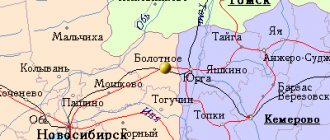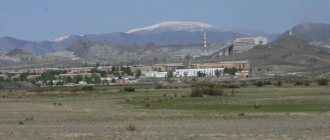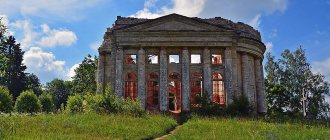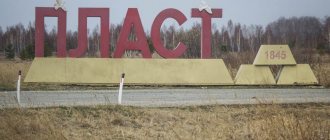Spirituality
(Smolensk region)
OKATO code:
66216501
Founded:
16th century.
City since:
1777 City of district subordination (Dukhovshchinsky district, Smolensk region)
Center:
Dukhovshchinsky district
Telephone code (reference phone)
| 48166***** | — |
Deviation from Moscow time, hours:
0
Geographic latitude:
55°12′
Geographic longitude:
32°25′
Altitude above sea level, meters:
220 Sunrise and sunset times in the city of Dukhovshchina
Notable natives and residents
18 km from Dukhovshchina, in the village of Chizhevo, G. A. Potemkin was born. Also not far from Dukhovshchina, in the village of Sutoki, the poet and writer Fyodor Nikolaevich Glinka was born[17].
The following people lived and studied in Dukhovshchina:
- Kozlov, Pyotr Kuzmich (1863-1935) - explorer of Central Asia.
- Zhukov, Grigory Nikitich (1902-1975) - Soviet military leader, Major General. Hero of the Soviet Union.
- Ardamatsky, Vasily Ivanovich (1911-1989) - Soviet writer, film screenwriter.
- Egorov, Sergei Mikhailovich (1913-1969) - Hero of Socialist Labor.
- B. N. Petrov - Academician of the USSR Academy of Sciences), first president of the Council for International Cooperation in the Field of Research and Use of Outer Space at the USSR Academy of Sciences - Intercosmos;
- E. P. Emelchenkov - Head of the Department of Informatics, Smolensk State University, Candidate of Physical and Mathematical Sciences;
- S. P. Emelchenkov - Deputy General Director of the Federal State Unitary Enterprise "Russian Post" for information technology, development of new products.
Map
| Spirituality: cards |
Dukhovshchina: photo from space (Google Maps) Dukhovshchina: photo from space (Microsoft Virtual Earth)
| Spirituality. Nearest cities. Distances in km. on the map (in brackets along roads) + direction. Using the hyperlink in the distance , you can get the route (information courtesy of the AutoTransInfo website) | |||
| 1 | Yartsevo | 22 (23) | SE |
| 2 | Kardymovo | 34 (41) | YU |
| 3 | Ozerny | 42 (46) | WITH |
| 4 | Smolensk | 51 (55) | SW |
| 5 | Safonovo | 54 (64) | IN |
| 6 | Demidov | 57 (70) | Z |
| 7 | Verkhnedneprovsky | 64 (84) | SE |
| 8 | Dorogobuzh | 64 (91) | SE |
| 9 | Glinka | 68 (149) | SE |
| 10 | Zharkovsky (Tver region) | 72 (273) | WITH |
| 11 | Kholm-Zhirkovsky | 76 (106) | NE |
| 12 | White | 77 (95) | NE |
| 13 | Yelnya | 85 (131) | SE |
| 14 | Pochinok | 88 (107) | YU |
| 15 | Velizh | 88 (116) | NW |
| 16 | Rudnya | 90 (115) | Z |
| 17 | Red | 94 (110) | SW |
| 18 | Monasticism | 101 (111) | YU |
| 19 | Khislavichi | 114 (137) | YU |
| 20 | Nelidovo | 115 (143) | WITH |
| 21 | Vyazma | 119 (140) | Z |
| 22 | Western Dvina | 120 (194) | WITH |
a brief description of
The city is located in the west of the Smolensk-Moscow Upland, on the river. Vostitsa (Dnieper basin), 12 km from the railway. Eryshi station, 57 km northeast of Smolensk.
Territory (sq. km): 11
Information about the city of Dukhovshchina on the Russian Wikipedia site
Historical sketch
On the site of the modern city in the 13th - early 14th centuries. There was a monastery of the Spirits (consecrated in the name of the Holy Spirit), at which already in the 15th century. There was Dukhovskaya Sloboda.
Known since the 2nd half of the 17th century. like a palace village. Later - the center of the camp, then the volost.
In 1777, the center of the Kasplyansky district of the Smolensk governorship was transferred to the village of Dukhovshchina, which was transformed into the city of Dukhovshchina, the district was renamed Dukhovshchinsky. Since 1796 - in the Smolensk province.
In the name, the suffix -shchina indicates that it arose as a designation of lands that belonged to the monastery, the center of which was Dukhovskaya Sloboda.
During the Patriotic War of 1812 it was burned. On August 28-29, 1812, a battle between the Russian and French armies took place near Dukhovshchina.
In 1856, in the district town of Dukhovshchina, Smolensk province, there were 4 churches, 417 houses, 22 shops.
In 1925, Dukhovshchinsky district was transformed into Yartsevsky district. Since 1929 in the Western region.
During the Great Patriotic War of 1941-45, it was occupied by Nazi troops on July 15, 1941. It was liberated on September 19, 1943 by troops of the Kalinin Front during the Dukhovshchina-Demidov operation. It was badly destroyed.
Economy
JSC "Ruslan" (dairy products), "Dukhovshchinalen" (production of flax fiber), brick factory, bakery, branch of the Smolensk Radio Components Plant.
Timber point, inter-forestry enterprise "Dukhovshchinsky" (timber harvesting, lumber production).
In the Dukhovshchinsky district, in the village of Prechistoye, there is JSC Smolensky Knitwear, a forestry enterprise; in the village of Ozerny there is a peat enterprise. Smolensk State District Power Plant.
They grow rye, wheat, barley, oats, potatoes, and flax. They raise cattle and pigs.
Deposits of peat, sand and gravel mixtures.
Culture, science, education
Dukhovshchina is the birthplace of Central Asian researcher Academician P.K. Kozlova.
Museums, galleries, exhibition halls
Dukhovshchinsky District History and Art Museum 216200, Smolensk region, Dukhovshchinsky district, Dukhovshchina, st. Bugaeva, 47/52 Phone(s): (48166) 41-931
Architecture, sights
The city is located in a hilly area crossed by wide valleys. The Vostrets stream flowing through one of them divides the city into two parts.
Until the end of the 18th century. had a radial-ring layout. In 1780, a regular plan was approved, according to which the blocks received the same rectangular shape. After the destruction during the Patriotic War of 1812, it was restored according to the gene. plan of 1817.
At the end of the 19th - beginning of the 20th centuries. stone and brick public and residential buildings were built.
In the post-war period, it developed according to the general plan of 1965, updated in 1981-82. They maintained the existing regular layout.
Church of the Holy Spirit (1995).
In the Dukhovshchinsky district, in the village of Basino - the Church of the Annunciation (1814), in the village of Velisto - the Church of the Nativity of the Virgin Mary (1828), in the village of Zagusinye - the Church of the Assumption (1785).
| Population by year (thousands of inhabitants) | |||||||
| 1856 | 2.7 | 1979 | 5.1 | 2005 | 4.5 | 2014 | 4.1 |
| 1897 | 3.1 | 1989 | 5.7 | 2006 | 4.4 | 2015 | 4.1 |
| 1913 | 6.6 | 1992 | 5.8 | 2007 | 4.3 | 2016 | 4.2 |
| 1926 | 2.9 | 1996 | 5.8 | 2008 | 4.2 | 2017 | 4.2 |
| 1931 | 2.7 | 1998 | 5.6 | 2010 | 4.1 | 2018 | 4.1 |
| 1939 | 3.9 | 2000 | 5.4 | 2011 | 4.4 | 2019 | 4.0 |
| 1959 | 3.3 | 2001 | 5.4 | 2012 | 4.2 | 2020 | 3.9 |
| 1970 | 4.4 | 2003 | 4.7 | 2013 | 4.1 | 2021 | 3.8 |
Population
| Population | ||||||
| 1856[5] | 1897[5] | 1913[5] | 1926[5] | 1931[5] | 1959[6] | 1970[7] |
| 2700 | ↗3100 | ↗6600 | ↘2900 | ↘2700 | ↗3293 | ↗4420 |
| 1979[8] | 1989[9] | 1992[5] | 1996[5] | 1998[5] | 2000[5] | 2001[5] |
| ↗5114 | ↗5747 | ↗5800 | →5800 | ↘5600 | ↘5400 | →5400 |
| 2002[10] | 2003[5] | 2005[5] | 2006[5] | 2007[5] | 2008[11] | 2009[12] |
| ↘4683 | ↗4700 | ↘4500 | ↘4400 | ↘4300 | ↘4200 | ↘4137 |
| 2010[5] | 2011[5] | 2012[13] | 2013[14] | 2014[15] | 2015[16] | 2016[1] |
| ↘4100 | ↗4400 | ↘4225 | ↘4100 | ↗4117 | ↗4125 | ↗4171 |
Excerpt characterizing Dukhovshchina
Bagration drives up in a carriage to the house occupied by Barclay. Barclay puts on a scarf, goes out to meet him and reports to the senior rank of Bagration. Bagration, in the struggle of generosity, despite the seniority of his rank, submits to Barclay; but, having submitted, she agrees with him even less. Bagration personally, by order of the sovereign, informs him. He writes to Arakcheev: “The will of my sovereign, I cannot do it together with the minister (Barclay). For God's sake, send me somewhere, even to command a regiment, but I can’t be here; and the entire main apartment is filled with Germans, so it’s impossible for a Russian to live, and there’s no point. I thought I was truly serving the sovereign and the fatherland, but in reality it turns out that I am serving Barclay. I admit, I don’t want to.” The swarm of Branitskys, Wintzingerodes and the like further poisons the relations of the commanders-in-chief, and even less unity emerges. They are planning to attack the French in front of Smolensk. A general is sent to inspect the position. This general, hating Barclay, goes to his friend, the corps commander, and, after sitting with him for a day, returns to Barclay and condemns on all counts the future battlefield, which he has not seen. While there are disputes and intrigues about the future battlefield, while we are looking for the French, having made a mistake in their location, the French stumble upon Neverovsky’s division and approach the very walls of Smolensk. We must take on an unexpected battle in Smolensk in order to save our messages. The battle is given. Thousands are being killed on both sides. Smolensk is abandoned against the will of the sovereign and all the people. But Smolensk was burned by the residents themselves, deceived by their governor, and the ruined residents, setting an example for other Russians, go to Moscow, thinking only about their losses and inciting hatred of the enemy. Napoleon moves on, we retreat, and the very thing that was supposed to defeat Napoleon is achieved. The day after his son’s departure, Prince Nikolai Andreich called Princess Marya to his place. - Well, are you satisfied now? - he told her, - she quarreled with her son! Are you satisfied? That's all you needed! Are you satisfied?.. It hurts me, it hurts. I'm old and weak, and that's what you wanted. Well, rejoice, rejoice... - And after that, Princess Marya did not see her father for a week. He was sick and did not leave the office. To her surprise, Princess Marya noticed that during this time of illness the old prince also did not allow m lle Bourienne to visit him. Only Tikhon followed him. A week later, the prince left and began his old life again, being especially active in buildings and gardens and ending all previous relations with m lle Bourienne. His appearance and cold tone with Princess Marya seemed to say to her: “You see, you made it up about me, lied to Prince Andrei about my relationship with this Frenchwoman and quarreled me with him; and you see that I don’t need either you or the Frenchwoman.” Princess Marya spent one half of the day with Nikolushka, watching his lessons, herself giving him lessons in the Russian language and music, and talking with Desalles; she spent the other part of the day in her quarters with books, an old nanny, and with God's people, who sometimes came to her from the back porch. Princess Marya thought about the war the way women think about war. She was afraid for her brother, who was there, horrified, without understanding her, by human cruelty, which forced them to kill each other; but she did not understand the significance of this war, which seemed to her the same as all previous wars. She did not understand the significance of this war, despite the fact that Desalles, her constant interlocutor, who was passionately interested in the progress of the war, tried to explain his thoughts to her, and despite the fact that the people of God who came to her all spoke with horror in their own way about popular rumors about the invasion of the Antichrist, and despite the fact that Julie, now Princess Drubetskaya, who again entered into correspondence with her, wrote patriotic letters to her from Moscow. “I am writing to you in Russian, my good friend,” wrote Julie, “because I have hatred for all the French, as well as for their language, which I cannot hear spoken... We in Moscow are all delighted through enthusiasm for our beloved emperor. My poor husband endures labor and hunger in Jewish taverns; but the news I have makes me even more excited. You probably heard about the heroic feat of Raevsky, who hugged his two sons and said: “I will die with them, but we will not waver!” And indeed, although the enemy was twice as strong as us, we did not waver. We spend our time as best we can; but in war, as in war. Princess Alina and Sophie sit with me all day long, and we, unfortunate widows of living husbands, have wonderful conversations over lint; only you, my friend, are missing... etc. Mostly Princess Marya did not understand the full significance of this war because the old prince never talked about it, did not acknowledge it and laughed at Desalles at dinner when he talked about this war. The prince's tone was so calm and confident that Princess Marya, without reasoning, believed him. Throughout the month of July, the old prince was extremely active and even animated. He also laid out a new garden and a new building, a building for the courtyard workers. One thing that bothered Princess Marya was that he slept little and, having changed his habit of sleeping in the study, changed the place of his overnight stays every day. Either he ordered his camp bed to be set up in the gallery, then he remained on the sofa or in the Voltaire chair in the living room and dozed without undressing, while not m lle Bourienne, but the boy Petrusha read to him; then he spent the night in the dining room. On August 1, a second letter was received from Prince Andrei. In the first letter, received shortly after his departure, Prince Andrei humbly asked his father for forgiveness for what he had allowed himself to say to him, and asked him to return his favor to him. The old prince responded to this letter with an affectionate letter and after this letter he alienated the Frenchwoman from himself. Prince Andrei's second letter, written from near Vitebsk, after the French occupied it, consisted of a brief description of the entire campaign with a plan outlined in the letter, and considerations for the further course of the campaign. In this letter, Prince Andrei presented his father with the inconvenience of his position close to the theater of war, on the very line of movement of the troops, and advised him to go to Moscow. At dinner that day, in response to the words of Desalles, who said that, as heard, the French had already entered Vitebsk, the old prince remembered Prince Andrei’s letter. “I received it from Prince Andrei today,” he said to Princess Marya, “didn’t you read it?” “No, mon pere, [father],” the princess answered fearfully. She could not read a letter that she had never even heard of. “He writes about this war,” said the prince with that familiar, contemptuous smile with which he always spoke about the real war. “It must be very interesting,” said Desalles. - The prince is able to know... - Ah, very interesting! - said Mlle Bourienne. “Go and bring it to me,” the old prince turned to Mlle Bourienne. – You know, on a small table under a paperweight. M lle Bourienne jumped up joyfully. “Oh no,” he shouted, frowning. - Come on, Mikhail Ivanovich. Mikhail Ivanovich got up and went into the office. But as soon as he left, the old prince, looking around uneasily, threw down his napkin and went off on his own. “They don’t know how to do anything, they’ll confuse everything.” While he walked, Princess Marya, Desalles, m lle Bourienne and even Nikolushka silently looked at each other. The old prince returned with a hasty step, accompanied by Mikhail Ivanovich, with a letter and a plan, which he, not allowing anyone to read during dinner, placed next to him.
Notes
- ↑ 12
www.gks.ru/free_doc/doc_2016/bul_dr/mun_obr2016.rar Population of the Russian Federation by municipalities as of January 1, 2021 - "Urban settlements in the Russian Empire", 1864, volume 4.
- THE USSR. Administrative-territorial division of the union republics on January 1, 1980 / Compiled by V. A. Dudarev, N. A. Evseeva. - M.: Publishing house "Izvestia of the Soviets of People's Deputies of the USSR", 1980. - 702 p. — P. 224.
- militera.
[militera.lib.ru/h/liberation/01.html Liberation of cities: A guide to the liberation of cities during the Great Patriotic War 1941–1945]. M.: Military Publishing House. [www.webcitation.org/619JbHkl0 Archived from the original on August 23, 2011]. - ↑ 12345678910111213141516
[www.MojGorod.ru/smolensk_obl/duhovschina/index.html People's encyclopedia “My City”. Spiritualism]. Retrieved June 23, 2014. [www.webcitation.org/6QY2JEPMl Archived from the original on June 23, 2014]. - [demoscope.ru/weekly/ssp/rus59_reg2.php All-Union Population Census of 1959. The size of the urban population of the RSFSR, its territorial units, urban settlements and urban areas by gender] (Russian). Demoscope Weekly. Retrieved September 25, 2013. [www.webcitation.org/6GDOghWC9 Archived from the original on April 28, 2013].
- [demoscope.ru/weekly/ssp/rus70_reg2.php All-Union Population Census of 1970 The size of the urban population of the RSFSR, its territorial units, urban settlements and urban areas by gender.] (Russian). Demoscope Weekly. Retrieved September 25, 2013. [www.webcitation.org/6GDOiMstp Archived from the original on April 28, 2013].
- [demoscope.ru/weekly/ssp/rus79_reg2.php All-Union Population Census of 1979 The size of the urban population of the RSFSR, its territorial units, urban settlements and urban areas by gender.] (Russian). Demoscope Weekly. Retrieved September 25, 2013. [www.webcitation.org/6GDOjhZ5L Archived from the original on April 28, 2013].
- [demoscope.ru/weekly/ssp/rus89_reg2.php All-Union Population Census of 1989. Urban population]. [www.webcitation.org/617x0o0Pa Archived from the original on August 22, 2011].
- [www.perepis2002.ru/ct/doc/1_TOM_01_04.xls All-Russian Population Census 2002. Volume. 1, table 4. Population of Russia, federal districts, constituent entities of the Russian Federation, districts, urban settlements, rural settlements - regional centers and rural settlements with a population of 3 thousand or more]. [www.webcitation.org/65AdCU0q3 Archived from the original on February 3, 2012].
- [www.gks.ru/bgd/regl/b08_14t/IssWWW.exe/Stg/z/13.htm Cities of the Smolensk region (number of inhabitants - estimate as of January 1, 2008, thousand people)]. Retrieved May 28, 2021. [www.webcitation.org/6hqLx9liu Archived from the original on May 28, 2016].
- [www.gks.ru/bgd/regl/B09_109/IssWWW.exe/Stg/d01/tabl-21-09.xls Number of permanent population of the Russian Federation by cities, urban-type settlements and districts as of January 1, 2009]. Retrieved January 2, 2014. [www.webcitation.org/6MJmu0z1u Archived from the original on January 2, 2014].
- [www.gks.ru/free_doc/doc_2012/bul_dr/mun_obr2012.rar Population of the Russian Federation by municipalities. Table 35. Estimated resident population as of January 1, 2012]. Retrieved May 31, 2014. [www.webcitation.org/6PyOWbdMc Archived from the original on May 31, 2014].
- [www.gks.ru/free_doc/doc_2013/bul_dr/mun_obr2013.rar Population of the Russian Federation by municipalities as of January 1, 2013. - M.: Federal State Statistics Service Rosstat, 2013. - 528 p. (Table 33. Population of urban districts, municipal districts, urban and rural settlements, urban settlements, rural settlements)]. Retrieved November 16, 2013. [www.webcitation.org/6LAdCWSxH Archived from the original on November 16, 2013].
- [www.gks.ru/free_doc/doc_2014/bul_dr/mun_obr2014.rar Table 33. Population of the Russian Federation by municipalities as of January 1, 2014]. Retrieved August 2, 2014. [www.webcitation.org/6RWqP50QK Archived from the original on August 2, 2014].
- [www.gks.ru/free_doc/doc_2015/bul_dr/mun_obr2015.rar Population of the Russian Federation by municipalities as of January 1, 2015]. Retrieved August 6, 2015. [www.webcitation.org/6aaNzOlFO Archived from the original on August 6, 2015].
- Page [www.admin.smolensk.ru/~duhov/Istoriya.html Historical information] on the website of the municipal formation "Dukhovshchinsky district"
- Shestakov P. D.
[www.memoirs.ru/rarhtml/Shestakov_IV91_3.htm Memories of V. I. Nazimov] //
Historical Bulletin
, 1891. - T. 43. - No. 3. - P. 707.







